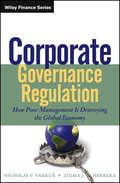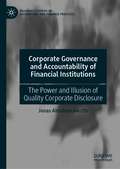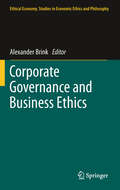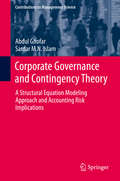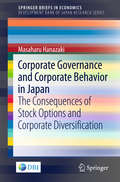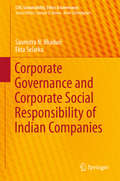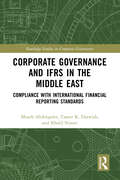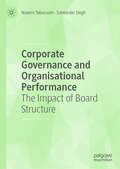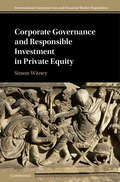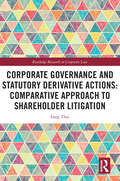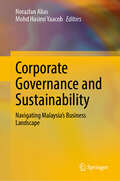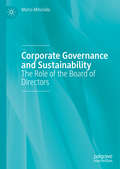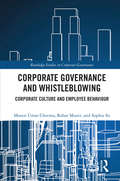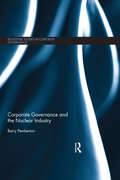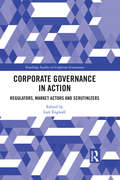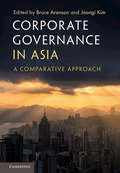- Table View
- List View
Corporate Governance Reforms in the EU: Do They Matter and How?
by Iryna Ivaschenko Petya Koeva BrooksA report from the International Monetary Fund.
Corporate Governance Regulation
by Nicholas V. Vakkur Zulma J. HerreraWhy U.S. corporate governance regulation has lost its way, and what must be done to improve itModern history persuasively demonstrates the inexorable link that binds comprehensive regulation to the global economy. This important book, rather than simply recount a litany of corporate governance failures, persuasively explains why, despite policymakers' best intentions, regulation has failed in the modern era. An objective study intended for a diverse readership, Corporate Governance Regulation unveils the underlying, root causes of regulatory failure. The result: A compelling and original analysis, broadly suited for a global audience of all backgrounds.Written by published, subject-area experts, the authors carefully delineate how U.S. corporate governance regulation, beginning with Sarbanes Oxley, lacks an adequate rational basis, as may be attributed to a non-existent policy dialogueThe witnessed result: A conspicuous lack of regulatory efficacy, enormous costs, coupled with paltry benefitsThe focus is upon reigniting a stalled, non-productive policy dialogue, by eschewing stale, overly-polemicized arguments, as needed to develop a common groundDrawing from an eclectic, analytic framework, governance experts Nicholas Vakkur and Zulma Herrera offer both the professional and global citizen alike a multi-dimensional understanding of issues critical to global economic health. Nuanced and persuasively argued, Corporate Governance Regulation represents a formidable catalyst in the elusive, ongoing quest for global economic stability.
Corporate Governance and Accountability of Financial Institutions: The Power and Illusion of Quality Corporate Disclosure (Palgrave Studies in Accounting and Finance Practice)
by Jonas Abraham AkuffoThe presence of sound corporate governance in a financial institution is important in maintaining the confidence of both the market and the public. The power that corporate governance holds over the success of some of the largest financial institutions in the world is not to be downplayed. This book methodically assesses the quality of corporate governance and mechanisms of accountability disclosures to various stakeholders. It is further intended to provide fresh insights into some specific corporate governance recommendations to help improve good governance in financial institutions, particularly in the United Kingdom and the EU but will also be applicable to other major economies. It explores what, when and how corporate governance has changed the financial institution functions and corporate executive behaviour by critically reviewing the pre- and post-financial crisis theoretical and empirical literature. Increasingly driven by the nature of complications, complexities and opacity in the operations of financial systems, corporate governance reporting plays an important role in the financial sector. It will provide insights into corporate governance disclosures over a long-term basis. This book should be a valuable asset to support the research of practitioners, students and all academics due to its stimulating and reflective insights into this fascinating topic.
Corporate Governance and Business Ethics (Ethical Economy #39)
by Alexander BrinkThis volume explores corporate governance from three perspectives: a traditional economic, a philosophical, and an integrated business ethics perspective. Corporate governance has enjoyed a long tradition in the English-speaking world of management sciences. Following its traditional understanding it is defined as leadership and control of a firm with the aim of securing the long-term survival and viability of that firm. But recent business scandals and financial crises continue to provide ample cause for concern and have all fuelled interest in the ethical aspects. As a result, corporate governance has been criticized by many social groups. Economic sciences have failed to provide a clear definition of the corporate governance concept. Complexity increases if we embed the economic approach of corporate governance in a philosophical context. This book seeks to define the concept by examining its economic, philosophical and business ethics foundations.
Corporate Governance and Contingency Theory: A Structural Equation Modeling Approach and Accounting Risk Implications (Contributions to Management Science)
by Abdul Ghofar Sardar M. N. IslamThis book analyzes the determinants and effectiveness of corporate governance in an integrated model drawing on contingency theory and employing structural equation modeling (SEM). Business competition as an environmental factor and strategy as an organizational factor are important determinants of corporate governance, while organizational performance and earnings quality are two dimensions of its effectiveness. This book focuses on the relationship between corporate governance and earnings management, and shows that corporate governance is effective in improving earnings quality and reducing accounting and governance risks. The authors also question the relation between corporate governance and company performance and present results of their analysis in this book.
Corporate Governance and Corporate Behavior in Japan: The Consequences of Stock Options and Corporate Diversification (SpringerBriefs in Economics #0)
by Masaharu HanazakiThis book carefully examines the effects of changes in the corporate governance structure on corporate behavior or company performance, using micro-data from listed companies in Japan. The author found that in Japan the introduction of stock options had neither a positive impact on profitability nor the negative side effects of promoting risk-taking behaviors. Furthermore, he found that corporate diversification and division of corporations showed negative impacts on profitability. The corporate governance structure of Japan has exhibited a large change from the second half of the 1990s to the present. There have been institutional reforms involving enterprise law, such as the introduction of stock options and the removal of the ban on holding companies. With respect to the ownership structure of a company, discernible trends are that the equity holdings of financial institutions and business corporations have fallen while the presence of foreign stockholders has risen. These trends are often pointed out as signs that the Japanese corporate governance structure has been approaching the American model and that this will energize Japanese firms. The author contradicts common academic theories, however, and concludes that the formation of the corporate governance which emphasizes the agency problem between shareholders and corporate managers is inadequate. He suggests that an institutional arrangement for a corporate governance system that values a variety of stakeholders' interests is greatly needed and concludes that perspectives on maximizing surplus values for various stakeholders and distributing the surpluses appropriately among the stakeholders will become increasingly important for the purpose of managing corporations.
Corporate Governance and Corporate Social Responsibility of Indian Companies (CSR, Sustainability, Ethics & Governance)
by Saumitra N. Bhaduri Ekta SelarkaThe book explores the theoretical and empirical issues relating to the interaction between corporate governance and corporate social responsibility (CSR) activities undertaken by Indian companies. It presents a highly detailed view on the evolution of CSR and its nexus with corporate governance. This is particularly timely in the context of the recent Indian Companies Act 2013, which mandates corporate social responsibility and revises the best corporate-governance practices for large companies. The findings of this study are unique in drawing from a unified framework of Indian corporate governance structure and corporate engagement in CSR. The book's scope is both academic and practical; the research methodology developed and utilized is useful for researchers, while the implications and the selection of variables provide useful information for practitioners and stakeholders. Finally, although it focuses on large Indian companies, the findings can also be applied to research on other emerging economies.
Corporate Governance and Economic Development: Identifying Critical Institutional Reforms
by Anna LanoszkaThis book explores the links between different corporate governance systems and their impact on economic development. It focuses on how institutional reforms, legislative changes and codified measures have influenced performance at the firm and country level. Drawing on detailed cases from the UK, USA, China, India, Poland, Brazil, Russia and South Africa, this book takes a truly international and comparative approach to understanding the relationship between regulatory frameworks and economic development. This will be a valuable text for students and researchers of economic development, corporate governance, international political economy, and economic and business history.
Corporate Governance and Finance Law
by Roy GirasaCorporate Governance and Finance Law is designed to educate students, researchers, and practitioners on the legal aspects of corporate financial markets within the United States, the Eurozone, and China.
Corporate Governance and IFRS in the Middle East: Compliance with International Financial Reporting Standards (Routledge Studies in Corporate Governance)
by Tamer K. Darwish Muath Abdelqader Khalil NimerThe rapid globalization of capital markets has increased attention toward examining the quality of the disclosure practices implemented by companies, as internationalization and globalization are the most important motives of the harmonization of financial statements preparation and presentation. Given the expansion of trade and the openness to foreign capital markets, investment decisions became not limited only for local users, but also international users may need to access the financial information. The issuance of International Financial Reporting Standards (IFRS) to be used throughout the world aims to improve the comparability and understandability of financial statements, and hence, to enhance investment decisions through helping investors across the borders to invest in multinational companies. Although fluid and under-developed institutional arrangements remain central features of emerging markets, ensuring effective corporate governance mechanisms would indeed support companies in complying with IFRS – the latter imposes a challenge for companies operating in emerging markets. This book evaluates the differences in the level of compliance with IFRS across the GCC states, exploring the impact of corporate governance on the level of compliance with IFRS and presenting an empirical analysis of companies across the GCC. It makes an important contribution by providing a detailed empirical analysis of the interplay between corporate governance and IFRS in emerging market setting and highlights the way for future research. It will provide international business, management, and accounting and finance students and senior practitioners with a completely new and updated guide to the work in the field of corporate governance and IFRS compliance in emerging markets.
Corporate Governance and Organisational Performance: The Impact of Board Structure
by Naeem Tabassum Satwinder SinghEstablishing a corporate governance strategy that promotes the efficient use of organisational resources is instrumental in the economic growth of a country, as well as the successful management of firms. This book reviews existing literature and identifies board structural features as key variables of an effective corporate governance system, establishing a multi-theoretical model that links Board structural characteristics with firm performance. It then, using a comprehensive empirical study of 265 companies listed on the Karachi Stock exchange, tests this conceptual model. This research serves as a significant milestone, reflecting the socio-economic setting of emerging economies, and highlighting the need for the corporate sector in emerging markets to move away from a 'tick-box' culture. It argues that the sector needs to implement corporate governance as a tool to mitigate business risks; appoint and empower non-executive directors to achieve an effective monitoring of management; and establish their own ethical and governance principles, applicable to the Board of Directors.Based on an extensive data base, collected painstakingly over five years, this book offers new insights and conceptual framework for further research in this area. Given the breadth and width of the research, it is a useful source of future reference for students, researchers and policy makers.
Corporate Governance and Responsible Investment in Private Equity (International Corporate Law and Financial Market Regulation)
by Simon WitneyPrivate equity-backed companies are ubiquitous and economically significant. Consequently, the corporate governance of these companies matters to all of us, and – not surprisingly – is coming under increasing scrutiny. Simon Witney, a practicing private equity lawyer, positions private equity portfolio companies within existing academic theory and examines the laws that apply to them in the UK. He analyses the actual governance frameworks that are put in place and identifies problems created by the legal rules – as well as the market's solutions to them. This book not only explains why these governance mechanisms are established, but also what they are expected to achieve. Witney suggests that private equity owners have both the incentives and the capability to focus on responsible investment practices. Good governance, he argues, is a critical success factor for the private equity industry.
Corporate Governance and Risk Management in Financial Institutions: An International Comparison Between Brazil and Germany (Contributions To Management Science)
by Robert C. GerickeThis book presents an overview of corporate governance and risk management, analyzing their interdependence and particularly their relevance in banking. It discusses current trends in corporate governance, such as stakeholder management, financial performance and the cost of equity, compensation schemes, board structures and shareholder activism. Further, it reviews some of the most important regulatory changes introduced since the latest financial crisis and highlights their impact on the annual reports of the banks under analysis. Lastly, the book assesses and compares major banks in Brazil and Germany with special emphasis on the aspects mentioned above, revealing surprising similarities between the banking systems of these otherwise disparate countries.
Corporate Governance and Statutory Derivative Actions: Comparative Approach to Shareholder Litigation (Routledge Research in Corporate Law)
by Lang ThaiThis book is the first comprehensive study of the statutory derivative action in Australia, using the Australian model as a reference point and comparing it with the UK, Canada, Singapore, New Zealand, Hong Kong and USA counterparts. The book includes an empirical study covering over a twenty-year period from the date the statutory framework came into operation, coupled with extensive case law analysis and comparisons with other jurisdictions. It informs the world about the uniqueness of Australia’s statutory derivative action, and what other countries can learn from it as shareholder protection and promotion of good corporate governance. While some countries have statutory derivative action, there are still countries that do not have the statutory framework that are considering introducing it into their corporate law. This book provides insights and suggestions for lawmakers, litigation practitioners and researchers worldwide in reforming their existing model.
Corporate Governance and Sustainability: Navigating Malaysia's Business Landscape
by Norazlan Alias Mohd Hasimi YaacobThis book presents a comprehensive exploration of contemporary issues in corporate governance and sustainability within the Malaysian context. Authored by experienced scholars and practitioners, each chapter delves into critical aspects shaping the landscape of business ethics, digital transformation, and societal responsibility. Beginning with an examination of role of digital transformation in driving sustainable innovation for Micro, Small, and Medium-Sized Enterprises (MSMEs), the volume goes on to explore the transformative potential and challenges of digital technologies on governance, sustainability, and taxation. It further highlights the significance of environmental, social, and governance (ESG) factors in measuring the sustainability and societal impact of businesses. Through insightful discussions on directorial responsibilities, social enterprises, stakeholder involvement in fraud prevention, and effective tax governance, this book offers valuable insights for practitioners, researchers, and students of business and accounting. By addressing key issues such as risk management, internal control, and tax compliance, this book serves as a timely resource for navigating the complexities of corporate governance and sustainability in Malaysia's dynamic business environment.
Corporate Governance and Sustainability: The Role of the Board of Directors
by Marco MinciulloThis book discusses the implementation of sustainability in corporate governance mechanisms since 2013 and assesses how much the role of the Board of Directors has changed as a result. The study explores the impact of legislation upon corporate governance in two European contexts, the UK and Italy, which have been affected differently by changes in national regulations since 2013. This investigation relies first on the analysis of interviews administered to the boards of directors of Italian firms, to highlight how far sustainability objectives were considered a real priority for their firms and how their role evolved in terms of specific duties and practices. Second, thanks to a rich dataset from 2013 to 2017, the investigation considers the corporate governance reports of top Italian and British listed firms, to identify how the integration of sustainability within corporate governance has been evolving since 2013, and how it has been disclosed. This insider perspective provides the reader with a set of tools useful for analysing firms’ engagement towards sustainability, and for assessing whether listed firms practice what they preach.
Corporate Governance and Sustainable Value Creation Models: Lessons from Germany, the United Kingdom, South Africa, India, Botswana, and Sri Lanka (CSR, Sustainability, Ethics & Governance)
by Shantha Indrajith LiyanageThe contemporary issue of the Anglo-American corporate vale model is short-termism. That is, the model operates in the interest of shareholders overlooking or at a cost of non-shareholder stakeholders’ interests including society and environment. The eye opening evidence is the 2008-09 global financial crisis. In these circumstances, this book examines how three Anglo-American corporate governance jurisdictions, the United Kingdom, South Africa, and India have recently modified their corporate value models for creating long-term sustainable value. The examination continues with the Anglo American corporate value models of two emerging countries also. Finally, the Continental European corporate (German) model is also analyzed. The comparative analysis is useful for revisiting not only the Anglo-Saxon Models in common law countries but also Continental European Models in civil law countries. This book is appropriate for scholars, academics, students, and policy makers who are interested in corporate governance models around the world.
Corporate Governance and Value Creation in Japan: Prescriptions For Boosting Roe
by Ryohei YanagiThis is the first book to furnish a root cause of the low valuation of Japanese listed companies by using, as qualitative evidence, unique global investor surveys, which are rarely available for Japanese companies. Also contained in this book as quantitative evidence is empirical research with regression analysis implying a positive correlation between corporate governance and value creation in Japan.The author explains the rationale underlying the suggestion of the Ito Review on return on equity (ROE) 8% guidance, an almost 50% discounted valuation of the cash held by Japanese companies, corporate value and ROE, equity spread as a key performance indicator for value creation, an optimal dividend policy based on optimal capital structure, risk-adjusted hurdle rates for value-creative investment criteria, and the synchronization of environmental, social, and governance with equity spread.Illustrated with relevant statistics, evidence of shareholders’ voices, case studies, and empirical research, the book is highly recommended for readers who seek qualitative and quantitative evidence of Japan’s problems and potential prescriptions in connection with value creation. “This book empirically proves the relationship between non-financial capitals defined by IIRC and corporate value, and provides a convincing method to unlock corporate value in Japan via Abenomics corporate governance reforms. A must read!”Richard S. Howitt, Chief Executive Officer, International Integrated Reporting Council (IIRC) “This book addresses emerging issues such as the "Power of Intangibles" in addition to IMA-defined "Equity Spread" as a gauge for value creation from the viewpoint of management accounting. It is highly recommended for finance and accounting professionals.”Jeffrey C. Thomson, CMA, CAE. President and CEO, Institute of Management Accountants (IMA)
Corporate Governance and Whistleblowing: Corporate Culture and Employee Behaviour (Routledge Studies in Corporate Governance)
by Rahat Munir Moeen Umar Cheema Sophia SuWhistleblowing is often about disclosing wrongdoings by members of organisations to persons or organisations that may be able to effect action. Media would at times publish stories of whistleblowers who engage in ‘heroic’ acts of exposing wrongdoings at work, but the whistlebowers often face significant negative consequences of their whistleblowing efforts. This book examines effects of national and organisational cultures on the whistleblowing decisions of employees. The book provides empirical evidence of association between organisational culture and whistleblowing and there appears to be a lower likelihood of whistleblowing in organisations that focus more on the cultural dimensions of respect for people, innovation and stability. It also illustrates how remaining silent or blowing the whistle in response to observed wrongdoings affects employees’ key work-related attitudes. This book would interest those wish to gain better understanding of the relationship between culture and whistleblowing in organisations.
Corporate Governance and the Nuclear Industry (Routledge Studies in Corporate Governance)
by Barry PembertonCorporate Governance and the Nuclear Industry explores the UK nuclear Legacy - governance issues associated with the decommissioning of a range of early-generation civil nuclear facilities. This book traces how we got here and the risks that have been taken, whilst presenting new research and thinking that is required to manage our nuclear Legacy. The book addresses a new analytical approach using notions of governance to review key historic events. This approach analyses these events using concepts of stakeholder control, accountability and regulation. Using these concepts and undertaking a more detailed analysis of the Legacy’s current governance arrangements; the conventional public sector-based solutions that attempt to harness private sector expertise, this book will contrast these with government responses to determine the degree of control over the Legacy and any possible control issues. Corporate Governance and the Nuclear Industry concludes that we need to recognise the legacy’s problems as exceptional rather than prosaic, and suggests that this requires exceptional governance solutions rather than the current form that is clearly failing.
Corporate Governance for Climate Transition
by Carolina Machado João Paulo DavimThis book is a focussed and up-to-date review about the key challenges, trends, implications, strategies, and ways of overcoming, that dynamic and competitive organizations are facing now and increasingly in future by climate change. The book creates a better understanding of the impacts that climate transition will have on organizations and how they are responding to find opportunities while overcoming the risks. What corporate governance models can and are organizations developing? What climate transition strategies are organizations creating? Who should be involved in the decision-making processes? To what extent are principles of transparency, equity, participation, inclusion, effectiveness, and efficiency present in corporate governance for climate transitions? These and other issues are just a few of the challenges that organizations by the climate change transition.International experts from a wide range of disciplines and perspectives have been invited to contribute to this book in order for providing a comprehensive and informed perspective for researchers, corporate leaders and students of business and management as well as environmental studies.
Corporate Governance in Action: Regulators, Market Actors and Scrutinizers (Routledge Studies in Corporate Governance)
by Lars EngwallOver time we have seen large corporations, in many cases with multinational operations, begin to play an increasingly significant role in modern society. This in turn has put the governance of these corporations into focus. Against this background, Corporate Governance in Action helps provide a framework for examining corporate governance through a focus provided by external pressures on large corporations. It also brings together the approach of economics and finance with theories in organization studies, such as aspects of resource dependency theory. This framework takes into consideration not only the market relations of modern corporations but also their dependence on regulators and different kind of scrutinizers. This thoughtful book is a complete research guide that provides a new understanding and applicable framework for advanced students, academics and researchers in the area of corporate governance and the related disciplines.
Corporate Governance in Africa (Routledge Studies on Law in Africa)
by Victor EdiagbonyaThis book discusses the issue of limited stakeholder recognition and protection of stakeholder interests within the Anglo-Saxon corporate governance model practised in many sub-Saharan African countries.The volume argues that the relative success of the Anglo-Saxon model in developed economies is attributed to the presence of functional institutions, such as effective legal systems, active external markets for corporate control, and organised civil societies, among others. Many African countries, such as Nigeria and South Africa, have adopted the UK corporate governance framework despite facing challenges occasioned by an inefficient legal system plagued by systemic corruption. Given the challenging institutional contexts in African countries, this book proposes an alternative corporate governance framework – the functional stakeholder model (FSM) – for the banking industry in countries facing similar institutional challenges; the FSM aims to promote stakeholder recognition and the protection of stakeholders' interests. The book draws on stakeholder and institutional theories in designing an alternative corporate governance model, the ‘FSM’ for banks operating in challenging institutional contexts.The book will interest regulators, bankers, auditors, academia, policymakers, and researchers in comparative corporate governance and financial regulation, especially banking regulation and stakeholders in developing and emerging markets.
Corporate Governance in Africa: Assessing Implementation and Ethical Perspectives
by Kerry E. Howell M. Karim SorourUsing a range of case-studies, thisbook analyzes corporate governance relationships between several Africancountries and the international community, providing an ethical assessment ofissues surrounding globalization and adherence to external governancemechanisms. Employing a methodological approach, Corporate Governance in Africa critiques occidental perspectives ofcorporate governance in relation to the needs of separate states, and thecontradictions that arise when local cultures are not taken in toconsideration. With case studies from Egypt, Ghana, Nigeria, South Africa,Kenya and The Gambia the book presents a comprehensive view of North, East,West and South Africa with contributions from global experts in the field. Theauthors critique the transformations deemed necessary for governance proceduresin order to facilitate confidence and inward investment for these Africanstates.
Corporate Governance in Asia: A Comparative Approach
by Bruce Aronson Joongi KimCorporate governance in Asia continues to attract global interest due to its critical importance to the world's fastest-growing region. The study of governance systems remains complicated by Asia's mix of legal traditions, market systems and social history. This comprehensive textbook provides a comparative overview of the corporate governance framework, theory and practice in major Asian countries. Students at all levels will gain an understanding of corporate governance systems in Asia and how they compare with models attributed to the US, the UK and Europe. Featuring six foundational chapters focusing on general theory and corporate governance systems and eight country-specific chapters, this book can be used as the basic textbook for a general course on comparative corporate governance or as an essential reference about corporate governance in Asia for a wide variety of professionals including academics, jurists, students, practitioners, investors, creditors, policymakers and analysts.

